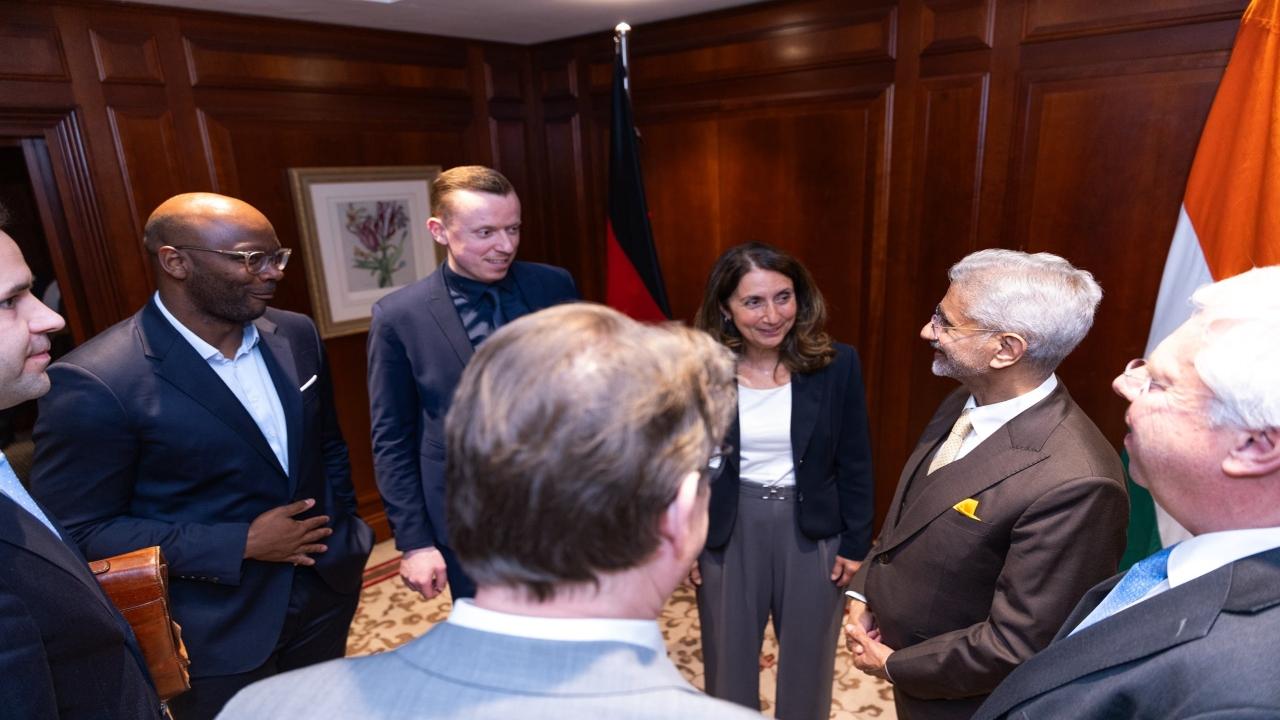In a post shared on X, the external affairs minister expressed his appreciation for the strong support from German parliamentarians in fostering deeper relations between the two countries

External Affairs Minister Dr Jaishankar interacts with members of the Bundestag during his official visit to Germany, on Thursday. Pic/X
External Affairs Minister Dr S Jaishankar interacted with members of the Bundestag (parliament) during his official visit to Germany on Thursday, and discussed various matters, including India's unwavering commitment to combatting terrorism in all its forms, reported news agency ANI.
In a post shared on X (formerly Twitter), Dr Jaishankar expressed his appreciation for the strong support from German parliamentarians in fostering deeper relations between the two countries.
"A good interaction with members of German Bundestag this evening in Berlin. Appreciate their strong support for continued growth of India-Germany relations. Also discussed with them India's firm commitment to combatting terrorism in all forms and manifestations," his post on X stated.
A good interaction with members of German Bundestag this evening in Berlin.
— Dr. S. Jaishankar (@DrSJaishankar) May 22, 2025
Appreciate their strong support for continued growth of India-Germany relations.
Also discussed with them India’s firm commitment of combatting terrorism in all forms and manifestations.
🇮🇳 🇩🇪 pic.twitter.com/Vd4bZcuDzq
Earlier in the day, the minister chaired a regional conference of ambassadors from Europe in Berlin. During the conference, he highlighted Operation Sindoor and reaffirmed India’s policy of zero tolerance towards terrorism. He also discussed strategies for further enhancing Europe-India engagement amid shifting global dynamics.
"Chaired the regional conference of our Ambassadors in Europe today in Berlin. We discussed #OpSindoor and our message of zero tolerance for terrorism. Also deliberated on various aspects of more deeply engaging Europe at a time of change," he wrote on X.
India launched Operation Sindoor on 7 May as a strong military response to the April 22 Pahalgam terror attack, which claimed 26 lives. The Indian Armed Forces targeted terror infrastructure in Pakistan and Pakistan-Occupied Jammu and Kashmir, resulting in the death of over 100 terrorists affiliated with terror groups such as Jaish-e-Mohammed, Lashkar-e-Taiba, and Hizbul Mujahideen.
Following the attack, Pakistan resorted to cross-border shelling across the Line of Control (LoC) and Jammu and Kashmir, along with attempted drone attacks along the border. India responded with a coordinated attack, damaging Pakistan's radar infrastructure, communication centres, and airfields across 11 airbases.
On May 10, an understanding for the cessation of hostilities between India and Pakistan was announced.
Dr Jaishankar is on a six-day official visit to the Netherlands, Denmark, and Germany, starting May 19. During his visit to the Netherlands earlier, he highlighted India’s determination to tackle terrorism. In an interview with a Dutch daily, the external affairs minister said, "We want a definitive end to terrorism. Our message is therefore: yes, the ceasefire has put an end to military actions against each other for now, but if the terrorist attacks from Pakistan continue, there will be consequences. The Pakistanis must understand that very well."
On Wednesday, Dr Jaishankar held productive discussions with his Danish counterpart Lars Lokke Rasmussen in Copenhagen, where the two leaders discussed the relations between the two countries and also addressed the issue of terrorism. Dr Jaishankar praised Denmark’s strong solidarity and support in India’s ongoing fight against terrorism.
(With ANI inputs)
 Subscribe today by clicking the link and stay updated with the latest news!" Click here!
Subscribe today by clicking the link and stay updated with the latest news!" Click here!










